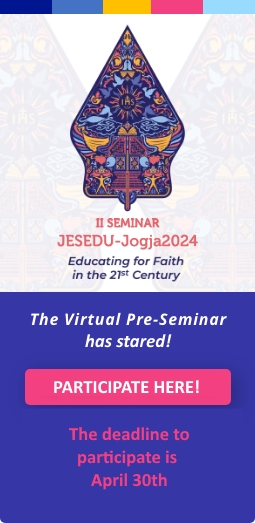“What is global citizenship? How is our curriculum reflective of global citizenship?” These are some of the pressing questions of school leaders across the international Jesuit institutions. As I was reflecting on the message of our university president – Fr Roberto C Yap, SJ, about universities pushing boundaries for students to be truly globally-ready, and how each school can and must respond to global issues, I was challenged to think of various intercultural learning opportunities that can be offered in the Junior high. As the Assistant Principal for Academics in Xavier University Junior High School, one of the key roles in the office is to look into the curriculum that is tailored to the needs of the students and responding to the call of our time. Then I came across Educate Magis Global Citizenship Course.
I learned that to be globally competent students, we must widen their horizons beyond the usual context so that they will be able to appreciate their identity, become culturally-aware, reflect on the different global issues, and create a meaningful action with the tools to ignite change on a global scale. I learned too that global citizenship programs should not be reduced to going abroad to learn the language, culture and diversity. I realized that indeed, as a school, we have been making small and big opportunities for global citizenship in the classroom. We have been doing Face to Faith video conferences, skype calls with our partners as a Microsoft Showcase School, and several cultural immersions. However, connecting with our global Jesuit network will make these initiatives forge greater impact and best outcomes.
The course served as a guide in my reflective practice. It provided starting points, inspiring lessons & resources to fully integrate global citizenship program. The course is divided into modules that would animate the global dimension of a school. I found multiple examples of lessons, where students can become proficient with an openness to global collaboration, – all ready for educators like me, to take back to their school and bring about positive and tangible change.
It is the most adaptable platform for introducing teachers with the much needed support in teaching for global citizenship, while still able to manage school workflows, giving teachers more time to focus on what matters most – teaching. We are fortunate with our partner Jesuit educators across the international campuses, who we share common views when it comes to educational excellence, supported by a collaboration tool in Educate Magis that support a learning culture.
To the other educators, now is the time to face these pressing questions and build global professional learning networks. Let us make the most of these networking opportunities, proactively engage with the Jesuit community, and look at the initiatives best implemented by the other Jesuit educators who are at the forefront of innovation. This is truly an appropriate formative example of the learning cycle- learning from the course, using it in the classroom, and sharing best and effective practices using the lessons. It is through sharing a deeper meaning of transformation in teaching & learning with technology tools where we can empower teachers to animate MAGIS.


